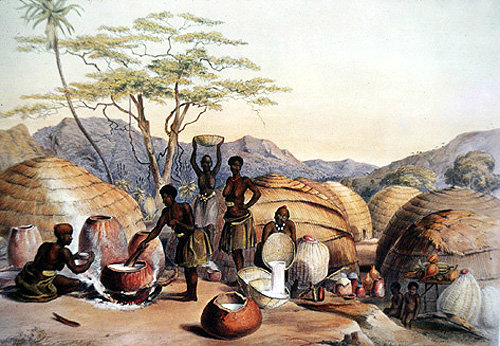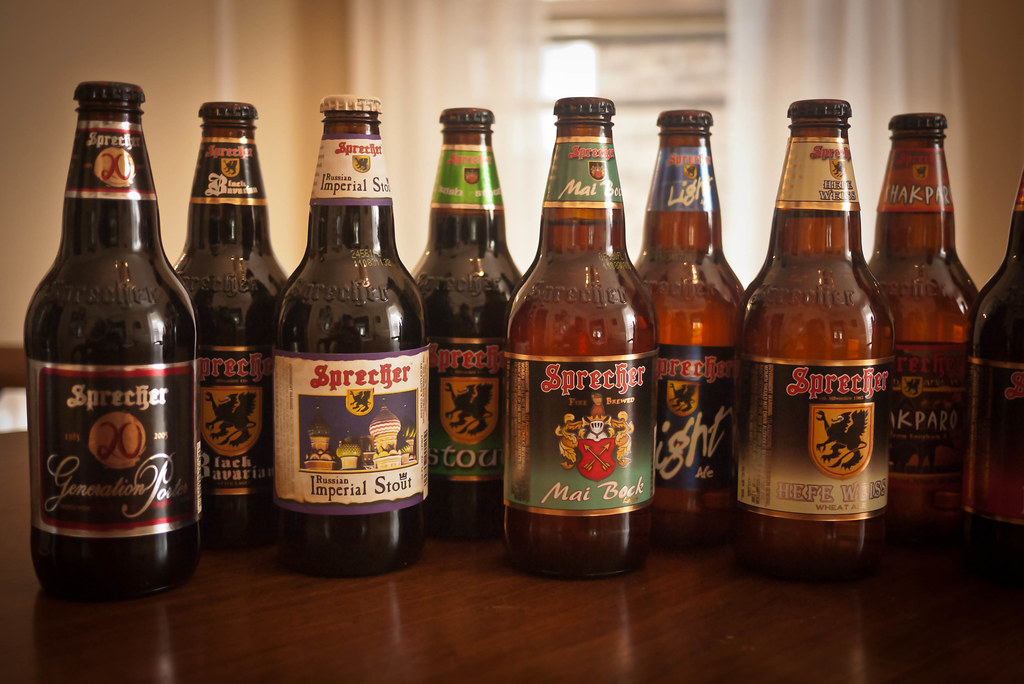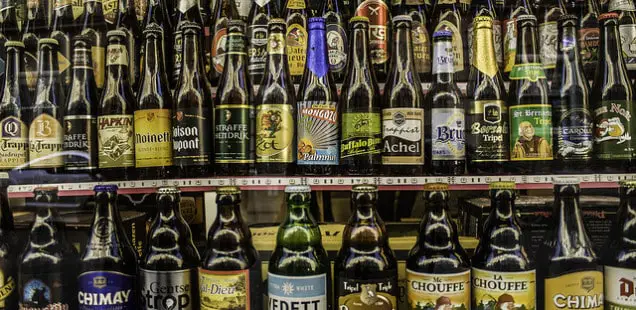Table of Contents
*This post may contain affiliate links. As an Amazon Associate we earn from qualifying purchases.
You probably know when World War II took place, what year the Declaration of Independence was signed, and that King Arthur was alive sometime during the 5th century. While all of those pieces of history are fascinating, you probably don’t know who invented the first beer.
What was the first glass of beer like? Was it a lager, a pilsner, a stout? Which civilization do we have to thank for giving the world arguably one of the best drinks on the planet? Consider this a crash course in Beer: 101.
The Dawn of the Brewery

It’s difficult to say who invented beer first. Ancient civilizations came and went without so much as a hint of their existence. Despite the lack of written evidence, archaeologists believe that the Mesopotamians were the first to discover the brewing process.
A Greek general by the name of Xenophon had the chance to taste their brew, which he described as very strong. In his own words, the beer was, “of a delicious flavor to certain palates, but the taste must be acquired.” This thick and malty beverage was as thick as porridge and drank through a straw to avoid the malt that floated to the surface. That’s right; you can thank beer for the invention of the straw.
Sometime around 5,000 BCE, the ancient Egyptians took the Mesopotamian method and dedicated themselves to perfecting it. Their brew was lighter, smoother, and more palatable with ingredients such as dates and pomegranates. By today’s standards, however, this drink would probably taste awful.
The first beer recipe was written down on papyrus and became an integral part of Egyptian society. Some of their mythological literature attributes this drink to the god Osiris, who also taught Egyptians how to plant crops. Regardless of how it came to be, beer was so popular that the people threw a festival each year in which they drank as much as they could handle.
By the middle era of Egypt’s existence, beer production had become a full-blown industry. There were multiple types of beer available for consumption, each classified by strength and flavor. If you walked into an ancient Egyptian bar, you could order a heqet, henket, hemu, or tenemu. It became a staple in the people’s diet, pay for a hard day’s work, and a valued source of nutrition.
From Ancient to Medieval Times

As Greece gave way to the Roman Empire, the world was expanding from the Middle East to modern day Europe. The fertile soil found in these northern lands was perfect for growing barley. For centuries, beer was not only a healthy part of a complete breakfast but provided a safe alternative to possibly contaminated drinking water.
As the Middle Ages began, the history of beer as we know it today began. Around 1150, German monks began using wild hops to flavor their brews. While they may not be the ones who invented beer, they certainly perfected the taste.
You might not relate religious leaders with drinking today, nearly every monastery during the Middle Ages had a brewery on site. Without these drunken monks, we might still be using roots and flowers in our breweries today. Hops quickly became the ingredient of choice over herbs and spices, balancing the sweetness of the sugar out with a deliciously bitter taste.
These beer enthusiasts did more than just introduce hops to an age-old recipe. German monks were responsible for introducing the world to the first lager. Their processes for perfecting the drink remain in place today by many of Europe’s top-ranked breweries.
Shortly after, Britain began to experiment with different stylings until they created the pale ale and the porter. Ireland crafted the dark and ever so delightful stout, while trade ships to India created the India Pale Ale as a way to preserve their finished product on long voyages.
By this point in history, you could take your pick of beer and expect it to taste exactly as it does today. That’s right; your ancestors were drinking some of the same recipes you’ve guzzled over the years.
Coming to America

With beer remaining an integral part of everyday life, it comes as no surprise that the initial colonists of the New World brought plenty of barrels with them. Believe it or not, one of the first structures the Pilgrims built was a brewery to ensure they wouldn’t run out of beer!
As immigrants began to reach American shores, the blend of cultures gave way to a mix of brewing styles. Dark ales had dominated settlements and colonies for over a hundred years, but Pilsner-style lagers soon became the go-to in the mid-1800’s.
By the 1900’s production in America skyrocketed as demand for lagers increased. There were an estimated 2,000 breweries up and running before the prohibition from 1920 to 1933. A significant depression struck the country right after prohibition ended, forcing many newly restarted breweries out of business.
However, companies that continued to brew illegally during those years had found ways to mass produce cheap beer. Namely, Budweiser and Schlitz came out on top in America’s new brewing scene. This trend of cheap ale and lager continued well into the 1970’s before the Tied House Law, making it illegal for breweries to sell on premise, was repealed.
Brewpubs slowly began to crop up across all 50 states, leading to the various microbreweries and styles for sale to today. However, beer’s history isn’t limited to American production.
Beer in Europe

The 1900’s played out a little differently for other parts of the world. Britain also experienced a temperance movement but never reached a full prohibition. Their restrictions were based around lowering alcohol strength, raising taxes, and making it illegal to “buy around” at the bar.
These bans and laws didn’t last long. However, their impact changed the types of beers readily available from World War I to World War II. Irish stouts replaced British variants, and the porter nearly vanished from existence.
Britain, specifically a company called Watney’s, soon created artificially carbonated cans and containers. If you enjoy cracking open a can or the sizzle from a freshly popped cap, then thank Watney’s Red Barrel Pale Ale.
Ancient Meets Modern

You can still experience what some of the first beer in existence tasted like thanks to the help of several archaeologists and breweries in existence today. Excavations have revealed these ancient breweries’ secrets with the aid of electron microscope, handing them off to brewmasters up to the challenge of concocting centuries-old recipes.
The closest taste to an original Egyptian recipe, called Tutankhamun Ale, was crafted by Courage Brewery in 1996. After producing just 1000 bottles, the factory shut down a few years later. If you can find one of these rarities, be prepared to pay a pretty penny for it.
When it comes to readily available recipes from centuries long past, Dogfish Head brewery works with various excavators to recreate old-world staples. Their King Midas Touch, for example, is a recreation of ingredients found during an archaeological dig at King Midas’ tomb. Their Ancient Ales lineup includes:
- Ta Henket: wheat, loaves of hearth-baked bread, chamomile, doum-palm fruit, and herbs just like the ancient Egyptians used to make.
- Birra Etrusca Bronze: malted barley, Italian wheat, and myrrh resin. This recipe was unearthed in Ethiopia.
- Chateau Jiahu: brown rice syrup, orange blossom honey, muscat grape, barley malt, and hawthorn berries. This recipe was discovered in modern-day China.
- Theobroma: a brew based on pottery fragments found in Honduras.
- Sah’Tea: a modern take on a 9th-century Finnish beer.
Great Lakes Brewing Co. has also recreated both a Mesopotamian and Sumerian recipe found on stone tablets. Other companies are working to learn who created the first beers in an attempt to incorporate ancient techniques and uncover the flavors of the past. Unfortunately, most of these brews are the short-runs and limited edition.
Keep your eyes peeled for various breweries attempting to recreate ancient beer, though. This is an excellent way to know what the beer your ancestors drank tasted like, as well as expand your pallet and try something new.
Suds of the Gods
Ancient literature often dictates that deities were responsible for giving humankind the gift of alcohol in the form of beer. While that’s probably not true, one thing is for sure: beer certainly tastes and makes us feel divine. The next time you crack open a cold one at the bar, you’ll have a deeper appreciation for the thousands of years that lead up to the drink in your hand as well as a fantastic story to tell your friends!

